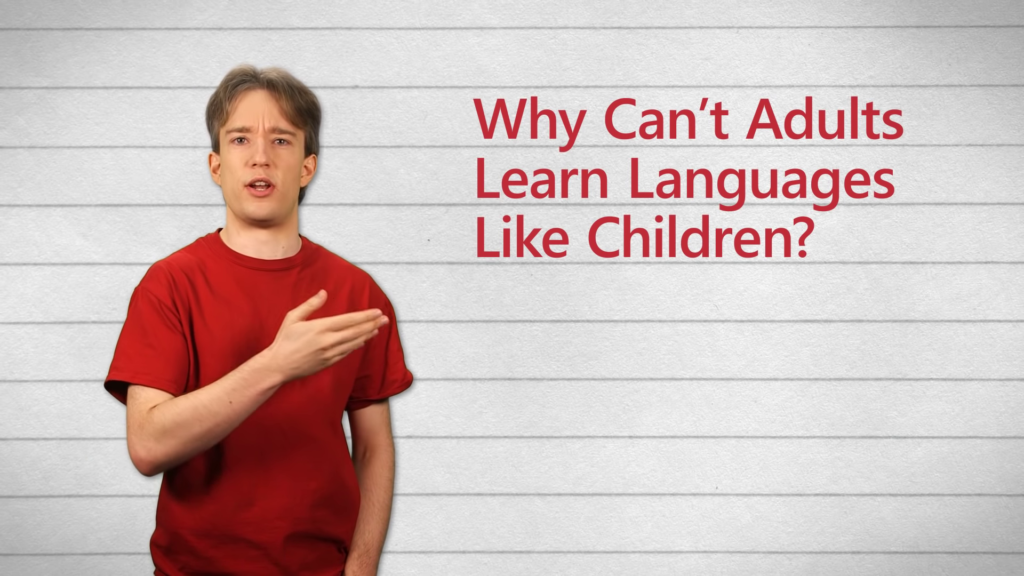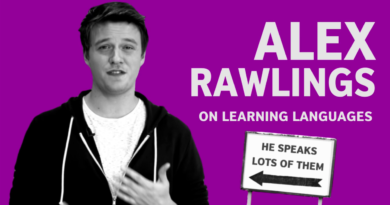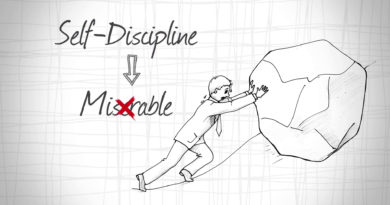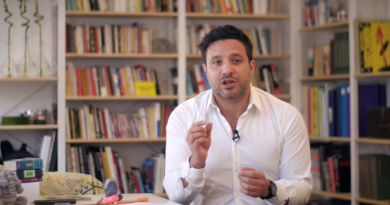Este vídeo de Tom Scott, com duração de 3m59s, aborda a crença amplamente disseminada de que crianças aprendem idiomas com mais facilidade do que adultos. Mas será que esta crença tem fundamento? Ao que tudo indica não existe uma unanimidade quanto a este assunto.
Na tabela após o vídeo você encontra o texto original em inglês, a tradução e um link para ouvir apenas o áudio. O arquivo de áudio você pode baixar clicando aqui.
| English Transcript | Tradução |
|---|---|
| If learning a language is so easy for young children, why is it so difficult when you're older? | Se aprender uma língua é tão fácil para crianças pequenas, por que é tão difícil quando você é mais velho? |
| We have entire industries devoted to helping adults learn languages 'the easy way'. | Temos indústrias inteiras dedicadas a ajudar os adultos a aprender línguas do "jeito mais fácil". |
| I mean, never mind there isn't an 'easy' way for adults to learn language, and never mind that different people learn in very different ways, there are a hundred companies that'll happily take your money. | Quero dizer, não importa se não há uma maneira "fácil" para adultos a aprenderem um idioma, e não importa que as pessoas aprendem de maneiras muito diferentes, há uma centena de empresas que alegremente ficarão com o seu dinheiro. |
| I've tried a couple. | Eu tentei algumas. |
| They didn't work all that well, and my French is just as stumbling as it was when I tried to learn it in school -- probably worse, given that I've forgotten half of what I had to learn then. | Elas não funcionaram muito bem, e meu francês é tão ruim agora como quando eu tentei aprendê-lo na escola - provavelmente pior, já que eu esqueci metade do que eu tinha aprendido então. |
| But young children just learn languages automatically, don't they? | Mas as crianças aprendem línguas automaticamente, não é? |
| Surround them with language speakers, and they'll just pick it up easily. | Cerque-os com falantes de idiomas, e eles aprenderão facilmente. |
| Well, first of all: easily? | Bem, em primeiro lugar: facilmente? |
| I mean, a baby spends about a whole year with nothing but input before it even starts producing any sort of coherent sound, while an adult can concentrate for an hour or so and get a few basic sentences memorised. | Quero dizer, um bebê gasta cerca de um ano inteiro apenas ouvindo antes mesmo de começar a produzir qualquer tipo de som coerente, enquanto um adulto pode se concentrar por uma hora ou mais e conseguir memorizar algumas frases básicas. |
| And that baby's learning constantly, almost every minute it's awake. | E esse bebê está aprendendo constantemente, quase a cada minuto que está acordado. |
| Adults have a heck of a lot of other things to do, including communicating and thinking in the languages we already know. | Os adultos têm um monte de outras coisas para fazer, incluindo a comunicação e pensar nas línguas que já conhecemos. |
| There is something called the 'critical period hypothesis'. | Há algo chamado "hipótese de período crítico". |
| The idea is that for the first couple of years of life, the brain is particularly good at picking up languages. | A idéia é que, para o primeiro par de anos de vida, o cérebro é particularmente bom em assimilar as línguas. |
| Noam Chomsky proposed a 'language acquisition device' in the brain that switched off as you got older. | Noam Chomsky propôs um "dispositivo de aquisição de linguagem" no cérebro que se desliga quando você envelhece. |
| Now, that hypothesis is well-known enough to be taken as fact by the public at large, but linguists are still debating it. | Agora, essa hipótese é bem conhecida o suficiente para ser considerada como um fato pelo público em geral, mas os linguistas ainda a estão debatendo. |
| Chomsky moved away from his language acquisition device, towards the idea that we steadily narrow down the parameters of the language we're taught from a long, long list of possibilities. | Chomsky abandonou sua teoria do dispositivo de aquisição de linguagem, para a idéia de que nós constantemente estreitamos os parâmetros da linguagem que somos ensinados a partir de uma longa, longa lista de possibilidades. |
| And that theory is still getting a lot of criticism. | E essa teoria ainda está recebendo muitas críticas. |
| In fact, if you ask the big question: 'how do children acquire language', then the answer is: nobody really knows, but some linguists have really strong opinions on it. | Na verdade, se você fizer a grande pergunta: 'como as crianças adquirem a linguagem', então a resposta é: ninguém realmente sabe, mas alguns linguistas têm opiniões muito fortes a respeito. |
| We know that language must be partly based on genetics, and partly based on surroundings. | Sabemos que a linguagem deve ser parcialmente baseada na genética, e parcialmente baseada no ambiente. |
| No matter how much you talk to a gorilla, it's never going to be able to understand more than a few words -- and there are serious questions about whether any of the great apes have actually managed that. | Não importa o quanto você fale com um gorila, ele nunca será capaz de entender mais do que algumas palavras-e há sérias dúvidas sobre se algum dos grandes macacos realmente conseguiram isso. |
| Even the smartest animal, with the best tutor, will never be a conversation partner. | Mesmo o animal mais esperto, com o melhor tutor, nunca será seu parceiro em um bate-papo. |
| So there must be something fundamentally human about language. | Então deve haver algo fundamentalmente humano sobre a linguagem. |
| But at the same time: there's nothing genetic about which language you can speak. | Mas, ao mesmo tempo: não há nada genético sobre qual língua você pode falar. |
| If I'd been adopted at birth by French-speaking parents, I would be speaking and thinking in French: there's no gene for the English language. | Se eu tivesse sido adotado no nascimento por pais de língua francesa, eu estaria falando e pensando em francês: não há nenhum gene para a língua inglesa. |
| There is one thing that's clear, though. | Mas há uma coisa que é clara. |
| We're born with the potential to speak any human language. | Nascemos com o potencial de falar qualquer linguagem humana. |
| But after a while, surrounded by just a few languages, or maybe just one, we work out what we need to listen for -- and we stop listening for anything else. | Mas depois de um tempo, cercado por apenas algumas línguas, ou talvez apenas uma, nós definimos o que precisamos escutar -- e nós paramos de escutar as outras coisas. |
| Many languages on the Indian subcontinent have a distinction between p and p(h). | Muitas línguas no subcontinente indiano têm uma distinção entre p e p(h). |
| So, pa would be different from p(h)a. | Assim, PA seria diferente de p(h)a. |
| Hear the difference? | Ouviu a diferença? |
| The second one is aspirated, there's a bit more air coming out my mouth. | O segundo é aspirado, há um pouco mais de ar saindo da minha boca. |
| Pa versus P(h)a. | PA versus P(h)a. |
| If you don't speak one of those languages: do you reckon you could hear a subtle difference like, when there's someone speaking at full speed? | Se você não fala uma dessas línguas: você acha que você poderia ouvir uma diferença sutil como, quando há alguém falando em plena velocidade? |
| Do you reckon you could produce that difference, reliably, without thinking about it? | Você acha que poderia produzir essa diferença, de forma confiável, sem pensar nisso? |
| Millions of people, billions of people, can and do, and they learned it automatically: but try and pick that up as an adult, and it's going to take you a long, long time. | Milhões de pessoas, bilhões de pessoas, podem e fazem, e eles aprenderam isso automaticamente: mas tente pegar isso como um adulto, e vai demorar muito, muito tempo. |
| It's called categorical perception: our brain takes this strange input, these electrical signals based on changes in air pressure, and we look for particular categories within them. | Isto se chama percepção categórica: nosso cérebro recebe essa entrada estranha, esses sinais elétricos com base em mudanças na pressão do ar, e nós olhamos para categorias específicas dentro deles. |
| And once we've filed something into a category, the other details don't matter. | E uma vez que tenhamos arquivado algo em uma categoria, os outros detalhes não importam. |
| But it's not all over if your brain is too set in its ways, like mine is. | Mas não está tudo acabado se o seu cérebro é muito focado em seus caminhos, como o meu é. |
| Adults are really quite good at learning vocabulary, the same way we're good at memorising anything else. | Os adultos são realmente muito bons em aprender vocabulário, da mesma forma que somos bons em memorizar qualquer outra coisa. |
| Most of the language courses aimed at adults emphasise that: they use flashcards and translation exercises, and don't worry too much about getting production perfect. | A maioria dos cursos de idiomas destinados a adultos enfatizam que: eles usam flashcards e exercícios de tradução, e não se preocupe muito sobre a obtenção de produção perfeita. |
| You may never sound, or even think, like a native speaker, but that doesn't mean you can't at least make yourself understood. | Pode ser que você nunca consiga soar, ou mesmo pensar, como um falante nativo, mas isso não significa que você não pode, pelo menos, fazer-se entendido. |










